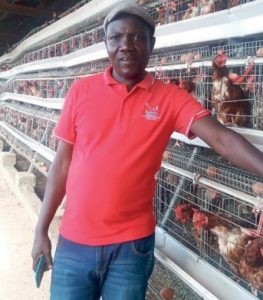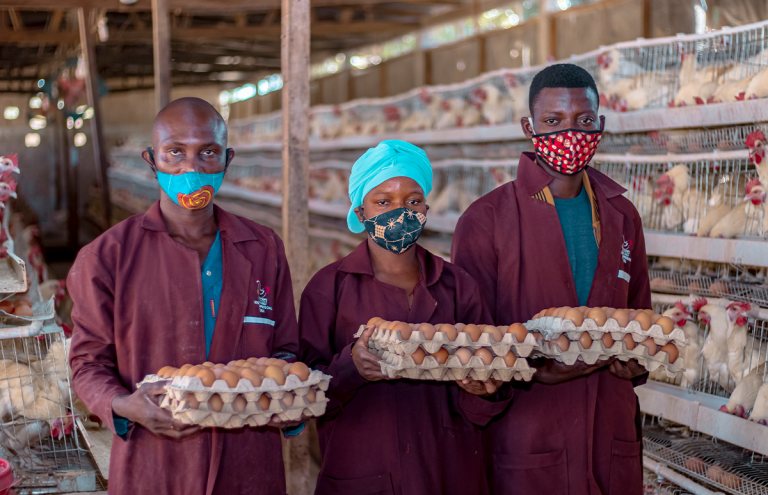Agribusiness Partners
Manuel Gabriel

Manuel Gabriel, also known by the name “Magas”, is a 43-year old business owner and CEO of AviMagas, a commercial egg production business with locations in Pemba and Montepuez. Manuel bene tted from Catalisa’s poultry nancing in 2019 and has continued to grow his egg production with the help of TechnoServe through continued business advisory services. The Catalisa team interviewed Manuel to highlight his success and plans for the future, during which he explained how his poultry business has transformed his life, as well as those of his family and surrounding community.
I started my path to entrepreneurship in di¬erent areas, mainly beginning with grocery shops. In 2012, I started poultry farming informally, and in 2018 I decided to legalize the activity, resulting in the creation of my company. In the same year I started knocking on several doors to see if I could get some start-up funding, and in 2019 received a grant from TechnoServe through Catalisa. Before Catalisa, I had two employees and after the funding managed to expand my poultry farm for egg production, increasing the number of workers.
Manuel was able to improve his business by increasing his production, but also by taking advantage of new technolo- gies through the advice of Catalisa’s technical team, in order to improve quality. “I improved my technology, as I stopped using a rudimentary system based on drinkers and feeders on the floor, and managed to obtain cages and 5,000 layers to start in Pemba. Over time, I realized that the space in Pemba was small so I decided to move to Montepuez, where I am now operating in the poultry value chain. I am experiencing great growth currently compared to 5 years ago, both in production and in the social component of the company, which has opened many doors for me.”
Manuel went on to explain that he enjoys the business currently and remains very busy. His daily routine consists of checking in with his fellow managers and accountants, and making sure everything is in order. A key portion of AviMa- gas’ operations includes controlling the feed stock and supply planning on a daily basis. “In this business, if you stay one day without feeding the birds, you will have 6 more days without producing any eggs. For a company like this, that is a big fail, so my daily routine is complex, as I have to see what I’m going to sell, how I’m going to sell it, what exactly I have to do to sell it, and then execute accordingly.”
In the interview, Manuel stressed the importance of staying on top of his business and remaining diligent, as others’ lives depend on his expertise. “In our business I don’t relax, and I don’t think that I’m going to rest for a while. If what I’ve sold is enough to buy more feed and give continuity, and enough to pay my 12 workers, as well as monthly finances such as INSS, then we have a routine, and one more circuit is closed to continue with success. Now we are planning for the future, in this case the end of the year, and we have to start another construction, a little faster to see if it is possible to bring the cages that are in Pemba in order to increase production. With the production that we have at this moment and with the demand that we have in the market, we have a lot of room for growth. The demand is very large and we even have future sales locked in, so the production of tomorrow will be paid today, and this encourages us to continue growing.”
He has a vision for the future to continue expanding, and is very optimistic about the possibility of scaling based on growing market demand, as the egg production in Cabo Delgado is still not sufficient to fill the market’s needs. “We started with a production of 200 chickens when we were informal. We went up to 300, then 600, then 1000, and then we had some complications, which is when we changed our business from broilers to layers. At this moment the produc- tion of layers is bringing us a very large horizon and we now have an aviary, so our idea is that by the end of this year, we will have another aviary to reach 15,000 – 17,000 layers, and in 5 years we will scale to at least 50,000 eggs per day.”
However, running a poultry business in Cabo Delgado is not easy, and often times financial planning and operational efficiencies are the drivers of success, given the sensitivity of the livestock. “The only big constraint we have is the large volumes of money that the business needs to feed the chick- ens. The feed is very expensive, almost 80% of the costs of egg production comes from feed and makes the compo- nents of the operational costs very high, and the profits a little bit lower, so it really functions well at scale and not in small volumes.
We are talking about having many workers, having big expenses with energy and water, expenses with transporta- tion, so these components we try to minimize at least to see if it is possible to turn a higher profit. The business is growing more and more, and many people come here to compliment our growth, but we do not feel this because what we want is to have much bigger production in 5 years, so we do not stop,” explained Manuel.

It’s a great feeling to hear a worker say, Look, I was able to build a house, I was able to buy a motorcycle, and I can now ride a motorcycle, thanks to the work at AviMAgas. I feel self-realized with the creation of the company, and I am creating good social impact, for myself, for my family, and for my community.
One of the components of his business which encourages Manuel to continue growing is the impact on his community and the jobs that he is able to provide to his colleagues. “When we were informal, we only had two workers and we did not pay INSS. When we legalized the business we entered the process in an aggressive way to also respond to the requirements of many competitions, and this helped the company grow in terms of workers.
So, with the support we had, we grew from 2 to 6, then 6 to 10, and eventually managed to have 12 workers. Of these 12 workers we are talking about some workers that are ‑xed, for which we pay INSS, but we have also had occasional workers for jobs like cleaning, and on average we support around 30-40 workers and this brings some economic impact to the community.